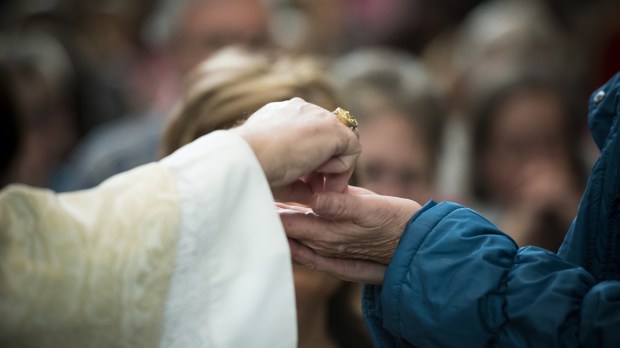Deacon Bill Ditewig has just posted some reflections on the pope’s exhortation—and in particular, he looks at the idea of conscience:
The conscience is subjective: it belongs to each, individual, human subject. While other persons: family, friends, pastors, bishops, deacons, religious, catechists, scientists and teachers may assist me in the formation of my conscience, ultimately, as Vatican II teaches, I am alone with God in my conscience. Someone else’s conscience cannot serve as — or replace — my own conscience. Therefore, my first reflection on the formation of conscience is simple: “Mind your (my) own business”! Consider the following scenario: SCENARIO: At Mass, the Fourth Sunday of Easter. John and Jane Doe, longtime parishioners of Holy Trinity Parish, Anytown, USA, join the communion procession, approach Deacon James Jones and receive Communion. REACTION #1: Mrs. Smith approaches Deacon Jones after Mass. “I’m scandalized, Deacon, that you gave Communion to those two! You know as well as I do that they’re divorced and re-married outside the Church! How dare you violate the Church’s law?” REACTION #2: After Mrs. Smith storms off, Dr. Baker heads over to the deacon. “What the hell is going on, Deacon? Those two people haven’t received Communion in years. Yes, I know they’re very active here, but they used to respect our church’s laws. Now, this? You know they’re divorced and all, Deacon, and you gave them Communion anyway! The bishop’s going to hear about this.” The weekend after AL was presented to the world, a friend presented me just that scenario. “What would happen if a divorced and remarried couple, who had refrained from receiving communion for many years, began receiving communion again? That would be a terrible scandal, and the pope says we are to avoid scandal!” What if John and Jane Doe’s story included the fact that they had gone to the pastor and, under his guidance, pastoral judgment and advice, in consideration of many factors known only to the two individuals involved, both John and Jane decide in conscience that each should return to the reception of Holy Communion? This process of conscience formation, which as the pope reminds us, is not done with a view to sidestepping the law. However, it is done with due consideration of unique aspects of their own past experiences and current responsibilities for their children and so on. And, they each reach a decision point in conscience. And, “according to it [each of them] will be judged. The conscience is a person’s most secret core and sanctuary, in which the person is alone with God, whose voice echoes in his depths.” BOTTOM LINE: If a person winds up receiving Holy Communion unworthily, the responsibility for doing so rests with that individual, and no one else. We do not force our own conscience on someone else. “We are called to form consciences, not to replace them.”
He has much more to say about this, along with the context for these teachings on conscience. Check it out.

